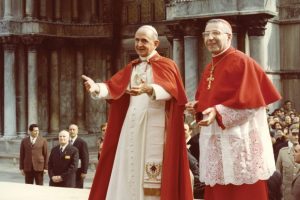There should be a word to describe the tangible energy of a new semester. Fed by syllabi and sharpened pencils and the hope of what is to come, this energy breathes life into students and teachers alike, sharing the gift of familiar newness. And I find that this season of new beginnings becomes more important with each year.
Our world, country, and church are all increasingly plagued by an egocentricity that twists values, systems, and even institutions into self-affirming personal agendas. We convince ourselves that our way of experiencing the world is the only correct one, and all others are wrong or incredibly misinformed. At the same time, we leave no space for discussion or dialogue. This is especially problematic in our church when we refuse to let Jesus’ message form us and instead shape Jesus’ mission and ministry in our own image. We run the risk of using theology and theological study as a mirror rather than a lens.
Refugees are treated like political pawns under the guise of law and order. Women are ignored under the façade of principle. Racism, xenophobia, and homophobia run rampant, shielded by thinking and acting and praying from places of privilege. Can good, discerning theology be an entry point for these difficult conversations?
I don’t have all the answers, and I admit that my own experiences and biases undoubtedly influence the way I do theology and interact with the church and world. But as a Catholic theologian and educator, I often wonder how we might engage our studies and teaching in a way that remains authentically Catholic but stays open to the movement of the Holy Spirit.
That’s why I like to begin each new semester by proposing three essential dispositions for studying theology. These dispositions set expectations for my students, while they also remind me of my call and responsibility, not only as a Catholic theologian and educator but as a disciple of Jesus Christ.
1. We must be willing to see differently.
Jesus asks dozens of questions throughout the gospels. These queries include everything from the relational “Who do you say that I am?” (Mark 8:29) when addressing Peter, to the seemingly obvious “Why are you troubled?” (Luke 24:38) when the disciples think they have encountered a ghost. My favorite of Jesus’ questions, however, comes from the beginning of the Gospel of John, when Jesus simply asks: “What are you looking for?” (John 1:38).
Our answer to this question has probably changed throughout our lives. Some days we might answer this more honestly than others, and there might have even been times in our lives when we were not able to answer this question at all. Even so, regardless of the context or relationship in which we find ourselves, Jesus’ answer is always the same: “Come, and you will see” (John 1:39).
As we continue to live in a church and world troubled by division and violence and injustice, this invitation to “Come and see” is all the more urgent. Amid the division, Jesus invites us to see a way of solidarity and relationship. Amid the violence, Jesus invites us to see a way of peace and reconciliation. Amid the injustice, Jesus invites us to see a way of retribution and love.
We must each be willing to answer this question. What do we see when we respond to Jesus’ question? And, perhaps just as important, what do we choose not to see? Are we willing to see goodness instead of malice? Can we assume charity instead of suspicion? We must see the world differently because of our relationship with Jesus Christ.
2. We must remain open to God’s invitation.
Consider the parable of the wedding feast as described in the Gospel of Matthew, where Jesus tells his followers that the realm of heaven is like a ruler who hosted a wedding celebration for his son. After instructing his servants to summon the invited guests, the ruler becomes enraged when they refuse to attend. Eventually, the ruler sends servants out into the streets to invite anyone they can find to the feast.
We might be surprised, even angry, when the ruler notices one of the guests is not wearing a wedding garment and instructs the attendants to “Bind his hands and feet, and cast him into the darkness outside, where there will be wailing and grinding of teeth” (Matthew 22:13). What gives? Why should someone who was literally invited from the streets be punished for not wearing something he didn’t have?
This causes justifiable alarm in modern readers. In Jesus’ time, however, custom dictated that guests be offered a celebratory garment when they arrived at the party. Knowing this, we realize the man was not punished for inadequate attire, but because he had willingly refused an integral part of the invitation. The darkness and sorrow he experienced next is the natural consequence of choosing to separate himself from the feast.
Life in Christ is always a response to God’s invitation. We do not initiate this relationship; we respond. Pope Francis reinforces this reality in his recent Apostolic Letter “On the Liturgical Formation of the People of God.” Referring to the apostles at the Last Supper, Francis writes, “No one had earned a place at that Supper. All had been invited.” In a church and world so marked by division, Francis reminds us that “everyone is invited to the supper of the wedding of the lamb.” When we respond to the invitation to the wedding feast, we must be willing to accept the entirety of the invitation, including wearing the wedding garment. This parable (and invitation) is not about Mass attire or even necessarily about sinfulness and grace. Rather, it is an urgent call for self-examination.
A life of discipleship—the “wedding garment”—requires a willingness to encounter Christ in a way that demolishes petty systems based on us-and-them and in-and-out. Discipleship is about solidarity and sacrifice, humility and vulnerability. It is the realization that life in Christ is messy, with no easy answers or quick fixes. Discipleship is a commitment to the ongoing self-appraisal that allows us to honestly and intentionally join our lives with others, recognizing that we do not and cannot exist as isolated individuals.
Pope Francis writes, “Sometimes we are tempted to be that kind of Christian who keeps the Lord’s wound at arm’s length. Yet Jesus wants us to touch human misery, to touch the suffering flesh of others. He hopes that we will stop looking for those personal or communal niches which shelter us from the maelstrom of human misfortunate and instead enter into the reality of other people’s lives and know the power of tenderness. Whenever we do so, our lives become wonderfully complicated and we experience intensely what it is to be a people, to be part of a people” (Evangelii Gaudium, 270). Life in Christ is wonderfully complicated, for it is grounded in the reality that strength comes from weakness and life springs from death.
3. We must embrace mystery.
When we hear the word mystery we might call to mind the popular murder-mystery board game Clue, where the primary objective is to gather evidence before making a definitive statement of fact via an accusation. But this popular understanding is not the same as mysteryin the Christian sense, where it is not about solving a problem or finding a definitive answer. Rather, the term mystery is used to describe something that is infinitely knowable.
When we describe God as mystery, we are saying that no matter how much we may learn about Divinity, there is still more to know—because God is infinitely knowable. While we can grow in our relationship with the Divine to better understand God and God’s work, our understanding will never be complete or comprehensive. To assume otherwise is blatant blasphemy.
We do not have all the answers, and we surely cannot know all the ways of God. In a world of absolutes, this liminality can be frightening. But that is the beauty of mystery and the essence of relationship with God. We must have the humility and courage to know we don’t have all the answers. If we allow it, mystery can be utterly freeing. Mystery can be life-giving and formative.
One of the most-cited definitions of theology is that of Saint Anselm, who famously notes that the study of theology is faith seeking understanding. Anselm’s choice of words is crucial, for theology is a study of an area beyond the reach of scientific or rhetorical reasoning. Theologians, teachers, and disciples alike would do well to remember that understanding is not synonymous with certainty.
Image: Unsplash/Jonathan Simcoe














Add comment